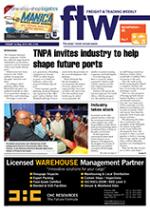With a landslide victory at the
polls, president-again Jacob
Zuma has enough political
muscle to push through his
promise of a more businessfriendly
regime – while
effectively being able to counter
the unions and other left-wing
opposition to his declared plan.
His voice and those of others
in his cabinet have also rejected
nationalisation of industries
and vowed to restore investor
confidence with stable policies.
These words have been said,
but what will they mean in
practice?
Mike Walwyn, director of
Seaboard Maritime Services
and chairman of the Port
Liaison Forum (PLF) of the
Cape Chamber of Commerce,
said: “In the run-up, the ANC
was talking about fostering a
business-friendly environment.
And, if they wish to arrest the
decline in support for the party,
I would think they’ll need to
make good on that.
“But, on the other hand, the
strong showing of the EFF
will tend to push them in the
direction of
satisfying
the demands
of the poor
and the trade
unions, so it’s
not going to be
easy.
“And we
shouldn’t
ignore the
possibility
that, with the
support of the
EFF, it would
be possible
for them to
achieve the
2/3 majority
necessary to push through any
constitutional amendments
they may have in mind.”
Andrew Pike, partner in
maritime legal specialists
Velden Pike Nichols, and
former board member of
the SA Ports Regulator, also
had the EFF in mind. “Their
strong showing,” he said, “gives
a message to the ANC that
government
will have to
move faster and
more effectively
in the creation
of jobs.”
He also
expected more
intensified
efforts to bring
about true
transformation
in the maritime
sector. “This,
in turn,” he
said, “should
(theoretically)
put more wealth into the
hands of the previously
disenfranchised. However, in
practice, that is generally not
what happens.”
Andrew Robinson,
maritime lawyer, director of
Norton Rose Fulbright SA,
and former chairman of the
Maritime Law Association
(MLA), also hopes that
the ANC’s
promises
will have a
positive growth
effect on the
maritime
industry.
“Hopefully,”
he told FTW,
“the new post-
May 2014
administration
will assist the
existing agents,
chandlers,
stevedores,
road hauliers,
ship repairers,
marine
insurers and brokers and the
like to grow their enterprises
and the number of people that
they can permanently employ.”
Robinson added that
the new regime should also
“concentrate on creating a
space” which will allow for
new maritime entities to enter
the shipping market.
“It’s hardly likely to appeal
to the EFF, but
there it is!”
Sue Wood,
operations
director of
Cargocare
Freight
Services, had
a touch of
cynicism in her
response.
“On the
positive side,”
she said, “I
think the trend
is moving
in the right
direction as far as future
business relationships with
government are concerned.
“But I doubt that this small
move will be sufficient to
generate greater partnering of
business with government.
“If anything, we are more
likely to see stronger pushback
from industry in its fight for
growth and a less harmonious
relationship than even that
which currently exists.”
Rob Garbett, MD of
Professional Aviation Services
and chairman of the Business
Aviation Association (Busa) of
Southern Africa, saw Zuma’s
“business-friendly” promises
failing, unless the ANC
completely restructured its
current stance.
“My view is that, if the ANC
government continues with
the bureaucratic restraints
and constrictions that are
suffered by small to medium
businesses, this section of the
economy will continue to lag.
And the major victim of this
policy is labour itself. I am
also most concerned about the
expansion, and militancy, of
labour unions in the economy.”
INSERT & CAPTION 1
The new regime
should also
“concentrate on
creating a space”
which will allow for
new maritime entities
to enter the shipping
market.
– Andrew Robinson
INSERT & CAPTION 2
The trend is moving
in the right direction
as far as future
business relationships
with government are
concerned.
– Sue Wood

